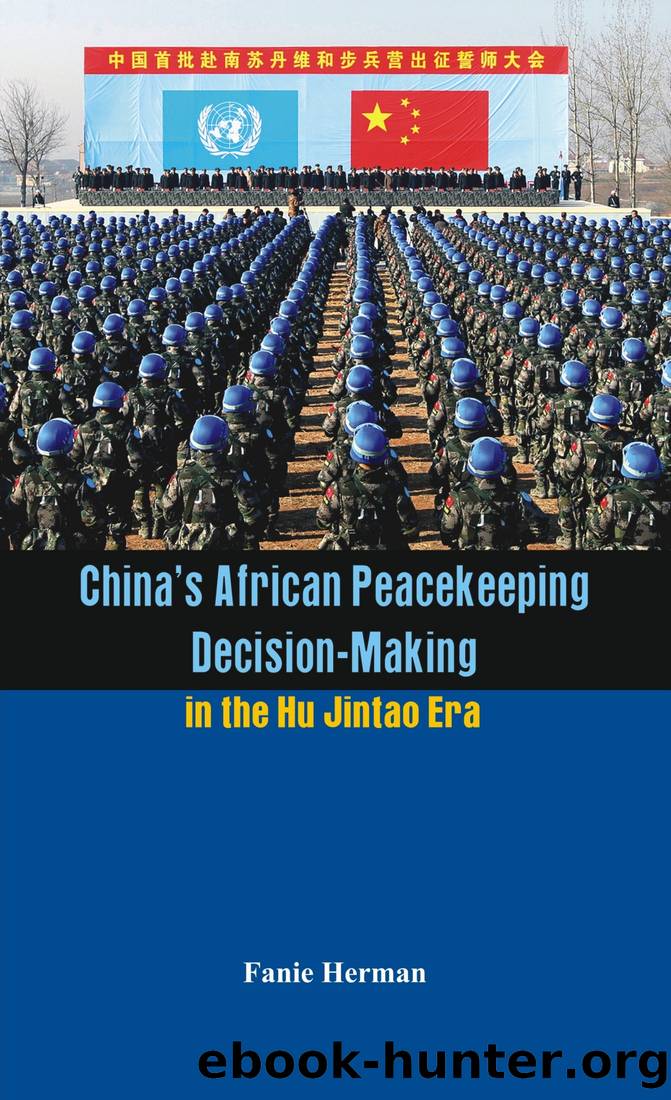China's African Peacekeeping Decision Making in the Hu Jintao Era by Fanie Herman

Author:Fanie Herman [Herman, Fanie]
Language: eng
Format: epub
Tags: International Relations, Globalization, History & Theory, Geopolitics, Political Science, Security (National & International), General
ISBN: 9789385563102
Google: WQbsCgAAQBAJ
Goodreads: 49826977
Publisher: VIJ BOOKS INDIA
Published: 2017-12-11T00:00:00+00:00
Chapter 6: Chinaâs PKO in the DRC, (MONUSCO)
The conflict in the DRC and the establishment of the United Nations Organization Mission in the Democratic Republic of the Congo (MONUC), which was renamed in 2010 to the United Nations Organization Stabilization Mission in the Democratic Republic of the Congo (MONUSCO), follows as an introduction to this chapter. Expressing Hu Jintaoâs official policy and the views of top party officials, who either have positions in the Politburo or serve on the CPC Central Committee, support the assumptions of the RAM that they had the authority to make decisions regarding Chinaâs relations with the DRC. Besides Hu, Chinaâs Vice-President, Zeng Qinghong,1 Premier Wen Jiabao, and Vice-Premier Hui Liangyu had meetings with Joseph Kabila, the president of the DRC or his senior diplomats, regarding the security issue in the DRC. These diplomats carried the security interests of China at heart by strengthening and promoting bilateral ties, which are central to the analytical framework of the RAM. The BPM was strongly influenced from compromise and bargaining between bureaucratic actors in producing results to decision-making from departmental and individual positions.
Chinaâs commercial interests in the DRC, primarily in the extraction of minerals, motivated the leadership to engage politically on issues relating to peace and security. The provision of postwar reconstruction and development assistance is an important feature of this political relationship, and together with the DRCâs firm adherence to the âOne-China Policy,â moved the leadership to act in sending peacekeeping troops to the country.
The Conflict in the DRC and the Establishment of MONUC and MONUSCO
Following the 1994 genocide in Rwanda and the establishment of a new government there, some 1.2 million Rwandese Hutus, including elements who had taken part in the genocide, fled to the neighboring Kivu regions of eastern DRC, formerly Zaïre, an area inhabited by ethnic Tutsis and others. A rebellion began there in 1996, pitting the forces led by Laurent Désiré Kabila against the army of President Mobutu Sese Seko. Kabilaâs forces, aided by Rwanda and Uganda, took over the capital city of Kinshasa in 1997 and renamed the country the Democratic Republic of the Congo (DRC).2 In 1998, a rebellion against the Kabila government started in the Kivu regions. Within weeks, the rebels had seized large areas of the country. Angola, Chad, Namibia and Zimbabwe promised President Kabila military support, but the rebels maintained their grip on the eastern regions. Rwanda and Uganda supported the rebel movement, the Congolese Rally for Democracy (RCD). The Security Council called for a ceasefire and the withdrawal of foreign forces, and urged states not to interfere in the countryâs internal affairs.3
Following the signing of the Lusaka Ceasefire Agreement in July 1999 between the Democratic Republic of the Congo (DRC) and five regional States (Angola, Namibia, Rwanda, Uganda and Zimbabwe) in July 1999, the Security Council established the UN Organization Mission in the Democratic Republic of the Congo (MONUC) by its resolution 1279 4 of 30 November 1999, initially to plan for the observation of the ceasefire and disengagement of forces, and maintain liaison with all parties to the Ceasefire Agreement.
Download
This site does not store any files on its server. We only index and link to content provided by other sites. Please contact the content providers to delete copyright contents if any and email us, we'll remove relevant links or contents immediately.
| Anthropology | Archaeology |
| Philosophy | Politics & Government |
| Social Sciences | Sociology |
| Women's Studies |
Born to Run: by Christopher McDougall(7121)
The Leavers by Lisa Ko(6945)
iGen by Jean M. Twenge(5409)
Sapiens by Yuval Noah Harari(5366)
Spare by Prince Harry The Duke of Sussex(5180)
The Kite Runner by Khaled Hosseini(5170)
Machine Learning at Scale with H2O by Gregory Keys | David Whiting(4295)
Bullshit Jobs by David Graeber(4179)
Never by Ken Follett(3937)
Goodbye Paradise(3802)
Livewired by David Eagleman(3765)
Fairy Tale by Stephen King(3370)
A Dictionary of Sociology by Unknown(3077)
Harry Potter 4 - Harry Potter and The Goblet of Fire by J.K.Rowling(3061)
The Social Psychology of Inequality by Unknown(3019)
The Club by A.L. Brooks(2919)
Will by Will Smith(2911)
0041152001443424520 .pdf by Unknown(2843)
People of the Earth: An Introduction to World Prehistory by Dr. Brian Fagan & Nadia Durrani(2733)
